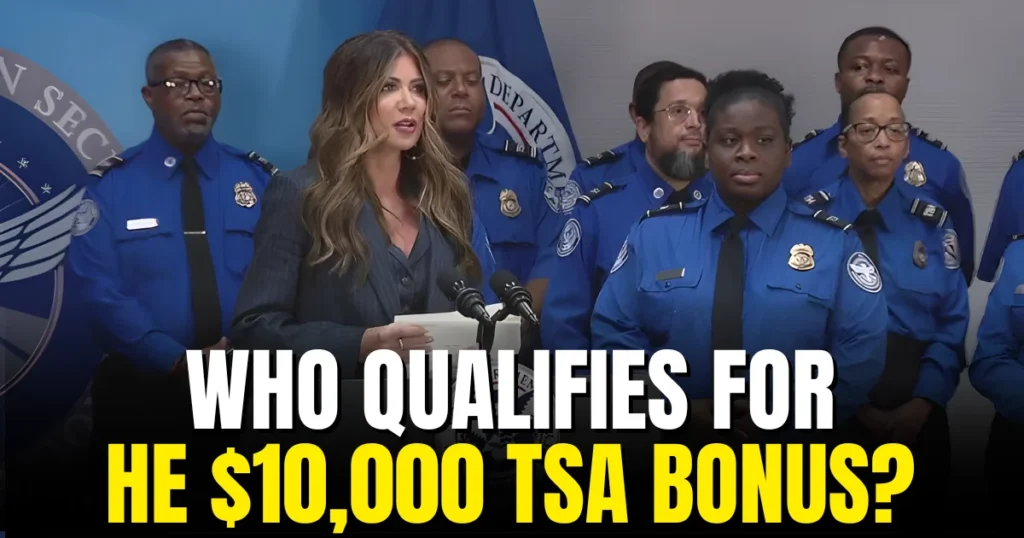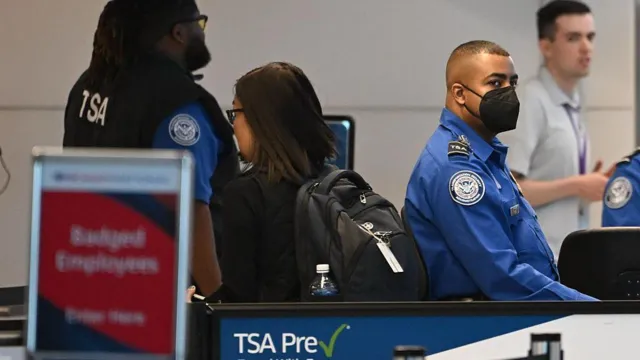TSA agents who worked through the 43-day government shutdown will receive $10,000 bonuses. Learn who qualifies and how it’s funded.
Table of Contents
TSA Agents Get $10K Bonuses After Government Shutdown
Introduction
Transportation Security Administration (TSA) agents who worked through the recent 43-day government shutdown will receive $10,000 bonuses, according to Homeland Security Secretary Kristi Noem. The announcement came during a ceremony at George Bush Intercontinental Airport in Houston, Texas, where Noem personally handed out bonus checks to nearly two dozen agents.
These federal employees served without pay during one of the longest government shutdowns in recent history. The bonuses aim to recognize their dedication and help them recover financially after weeks of financial hardship.

Who Qualifies for the $10,000 TSA Bonus?
Requirements for Bonus Eligibility
The Department of Homeland Security has not released a complete list of qualification standards. However, based on Secretary Noem’s statements, the program targets officers who went above normal duty expectations.
Potential qualifying actions include:
- Showing up daily despite missing paychecks for over six weeks
- Filling staffing gaps by volunteering for additional work hours
- Performance reviews showing outstanding duty execution during the crisis
- Keeping airport checkpoints operational amid nationwide travel chaos
DHS plans individual assessments rather than blanket distributions. Each Transportation Security Officer’s contribution will be reviewed separately to determine bonus eligibility.
The agency has not confirmed how many of the approximately 60,000 TSA employees will receive payments. Evaluations are ongoing.
Breakdown of TSA Shutdown Compensation
| Compensation Type | Amount | Eligibility |
|---|---|---|
| Bonus Payment | $10,000 | Exemplary service during shutdown |
| Backpay | Full wages owed | All employees who worked without pay |
| Additional Overtime | Varies by hours | Agents who took extra shifts |
Source: Department of Homeland Security statement, 2025

How Will DHS Fund These Bonuses?
Funding Sources
The Department of Homeland Security will use carryover funds from fiscal year 2025 to pay the bonuses. According to Noem, cost savings came from:
- Reduced contract spending during the shutdown
- Budget reallocation from non-essential programs
- Administrative cost savings
This approach avoids requiring new congressional approval, allowing faster distribution to affected workers.
Government Shutdown Impact on Air Travel
Timeline of Events
| Date | Event |
|---|---|
| October 1, 2025 | Government shutdown begins |
| Mid-October | FAA limits flights due to staffing |
| Late October | Air traffic controllers call in sick |
| November 12, 2025 | Shutdown officially ends (43 days) |
Operational Challenges
The Federal Aviation Administration (FAA) imposed flight restrictions during the shutdown due to:
- Air traffic controller shortages from sick calls
- TSA agents taking second jobs to cover expenses
- Security checkpoint delays from reduced staffing
- Nationwide travel disruptions affecting millions
Tens of thousands of federal employees worked extra shifts to maintain operations while colleagues struggled financially.

President Trump’s Proposal for Air Traffic Controllers
President Donald Trump suggested extending similar $10,000 bonuses to air traffic controllers who maintained attendance during the shutdown. These FAA employees faced identical financial pressures but kept flights operating safely.
No official announcement has been made regarding this proposal, but it signals recognition of essential workers across multiple agencies.
What This Means for Federal Employees
Precedent for Future Shutdowns
This bonus program establishes a new standard for compensating federal workers during government shutdowns. Key implications include:
- Recognition of essential workers who cannot strike or refuse work
- Financial relief beyond standard backpay
- Retention incentives to prevent experienced agents from leaving
- Morale boost for DHS and TSA workforce
Career Opportunities in TSA
The bonuses highlight the challenging but rewarding nature of federal security careers. TSA positions offer:
- Competitive federal benefits packages
- Job security in essential roles
- Opportunities for advancement within DHS
- Specialized training and certifications
Expert Perspective on Federal Worker Compensation
Federal employee unions have long advocated for shutdown protections. While bonuses provide relief, advocates argue that:
- Essential workers should never work without guaranteed pay
- Future shutdowns need legislative solutions
- One-time bonuses don’t replace stable funding
The bonus program represents progress but doesn’t eliminate underlying budget issues that cause shutdowns.
FAQs About TSA Agent Bonuses
1. How many TSA agents will receive the $10,000 bonus?
The exact number hasn’t been disclosed. DHS stated it will evaluate every employee individually based on attendance, extra shifts worked, and exceptional service during the 43-day shutdown.
2. When will TSA agents receive their bonus payments?
DHS hasn’t announced a specific distribution timeline, but payments are expected to begin immediately following evaluations. Backpay for all affected workers has already been processed.
3. Do all TSA employees qualify for the shutdown bonus?
No. Only Transportation Security Officers who demonstrated “exemplary service” qualify. This includes consistent attendance and taking on additional responsibilities during the shutdown period.
4. Will air traffic controllers receive similar bonuses?
President Trump suggested this, but no official program has been announced for FAA air traffic controllers yet. The proposal remains under consideration.
5. How does the government fund these bonuses without Congressional approval?
DHS is using carryover funds from fiscal year 2025 and savings from reduced contract spending during the shutdown, which doesn’t require additional Congressional authorization.
Conclusion
The $10,000 bonus program for TSA agents sets an important precedent for recognizing federal employees who serve during government shutdowns. While the exact number of recipients remains unclear, the initiative provides much-needed financial relief to workers who maintained national security without pay for 43 days.
As DHS continues evaluating employees for eligibility, this program may influence future compensation policies across federal agencies.


